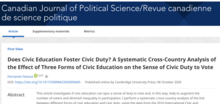Le doctorant Fernando Feitosa a publié un article dans la revue Electoral Studies, dans lequel il se penche sur la relation entre perception de la corruption et sens du devoir civique, et son rapport à la participation électorale.
SYNOPSIS : Corruption is generally associated with low electoral participation. A recurrent explanation of the negative correlation between corruption and electoral turnout involves the rational calculus of the costs and benefits of voting. More specifically, in a context of high corruption, citizens do not vote because they think that doing so will hardly affect policy decisions. A number of influential studies has argued that corruption affects citizens' electoral engagement in a different and more fundamental way as well: It erodes their sense of civic duty to vote in elections. Yet, a relation between corruption and civic duty and a mediation effect of the attitude remains empirically untested. This article examines empirically whether perceived corruption and sense of civic duty are correlated, as well as whether civic duty mediates the relation between perceived corruption and turnout. It does so with the pooled Making Electoral Democracy Work data, as these data contain measures on individuals’ sense of civic duty to vote in four election levels, namely, national, regional, European, and municipal elections, as well as on their perception of corruption in each of these government levels, and on their participation in these four election levels as well. I find a weak relation between perceived corruption and civic duty, and a low mediation effect of the attitude (compared with rational factors), irrespective of the election level.
Retrouvez l’article au complet : Feitosa, Fernando, 2020. “Theoretically, yes, but also empirically? How the corruption-turnout link is marginally explained by civic duty to vote”, Electoral Studies, 66, https://doi.org/10.1016/j.electstud.2020.102162
À lire ici : https://www.sciencedirect.com/science/article/pii/S0261379420300469?via%3Dihub
